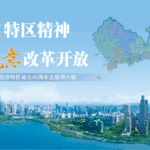On October 10, Time magazine released its 2025 Best Inventions list, featuring 300 breakthrough inventions and 100 special mentions. Several Shenzhen companies including Huawei, BYD, Transsion, Insta360, and Bambu Lab had their star products recognized, praised for their sophisticated design and outstanding innovation that have made them popular in global markets.
Recently, various domestic and international rankings have been released, including the World Intellectual Property Organization’s Global Top 100 Innovation Clusters, Fortune Global 500, “2025 China’s Top 500 Enterprises,” MIT Technology Review’s “50 Smartest Companies,” “GEI China Unicorn Enterprise Research Report 2025,” “2025 World’s Top 2% Scientists,” and MIT’s “Innovators Under 35.” Shenzhen has demonstrated remarkable performance, with numerous companies, institutions, and individuals frequently appearing on these lists.
The recognized entities include globally renowned large enterprises like Ping An, Huawei, BYD, and Tencent, as well as specialized industry leaders such as TCL RayNeo, Bambu Lab, Comake Tech, and Insta360. Universities and research institutions including Shenzhen University, Southern University of Science and Technology, The Chinese University of Hong Kong, Shenzhen, and Shenzhen Medical Academy of Research and Translation have also been acknowledged. These rankings not only reveal the innovation formula of this modern international metropolis but also showcase Shenzhen’s global influence and competitiveness in technological innovation and industrial advancement.
Shenzhen Companies Shine Globally
The Fortune Global 500 is the most renowned ranking for measuring large global corporations. The latest ranking shows 130 Chinese companies on the list, including 10 Shenzhen enterprises: Ping An, Huawei, BYD, Tencent, China Merchants Bank, Vanke, SF Express, Shenzhen Investment Holdings, Luxshare Precision, and China Electronics. These 10 Shenzhen companies also dominate various Chinese Top 500 enterprise rankings, with most ranking within the top 100. The latest Fortune China 500 list shows 38 Shenzhen companies making the cut, including the aforementioned 10 Global 500 companies along with others such as CIMC, Digital China, ZTE, Sunshine Insurance, Liye Group, CGN, SLC, Gemdale, Transsion, WeBank, Yongdao Holdings, Aishide, Skyworth, Nonfemet, Kingold, Sunwoda, OCT, Tianxing Cloud, Shenzhen Energy, Inovance, Mindray, Avary, GEM, Neptunus, CDB Financial, Shenzhen Gas, AAC, and Guangzhou-Shenzhen Railway.
Recently, the China Enterprise Confederation and China Enterprise Directors Association jointly released the “2025 China’s Top 500 Enterprises” list, with 27 Shenzhen companies selected, including Honor Terminal and Youhe Industry.
In Shenzhen, while large enterprises stand strong, numerous innovative companies are breaking new ground. Since establishing its “50 Smartest Companies” selection in 2010, MIT Technology Review has been committed to discovering innovative enterprises with global influence, particularly valuing companies that develop and utilize new technologies while capturing market and business opportunities. The latest results show 9 Shenzhen companies on the list, including giants like Huawei and BYD that serve as “chain leaders,” as well as 7 “star” companies that have achieved leadership in specialized sectors through technological innovation: TCL RayNeo, Bambu Lab, Comake Tech, Insta360, Game Science, Shokz, and Guangyi Tech.
Another category worth special attention is the unlimited potential of “unicorn” companies. The “GEI China Unicorn Enterprise Research Report 2025” shows Shenzhen has 42 unicorn companies, including 13 new unicorns in 2024: Yinwang Intelligence, Honor, Yuanxiang XVERSE, Connotation Medical, IAM Robotics, Liding Semiconductor, Hongxin Yu, Creality, Ape Man Technology, Laplace, Infypower, CodeMao, and Bananain.
Recent specialized sector rankings show 29 Shenzhen companies selected for China’s Top 500 Service Enterprises, with multiple Shenzhen companies ranking in the top 100, including Ping An, Tencent, China Merchants Bank, Vanke, SF Express, Shenzhen Investment Holdings, and Sunshine Insurance. Forbes China released its Top 30 for International Operations, with 5 Shenzhen companies selected: BYD, Longsys, Luxshare Precision, XCC Data, and Insta360.
These companies primarily focus on advanced manufacturing and modern services, covering both established advantage industries like electronic information, new energy vehicles, and smart manufacturing, as well as emerging fields such as semiconductors and integrated circuits, artificial intelligence, robotics, biomedicine, medical devices, digital energy, and fintech. Each company possesses unique “killer applications


